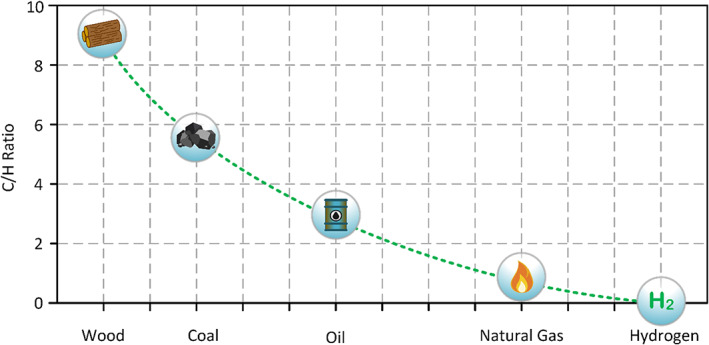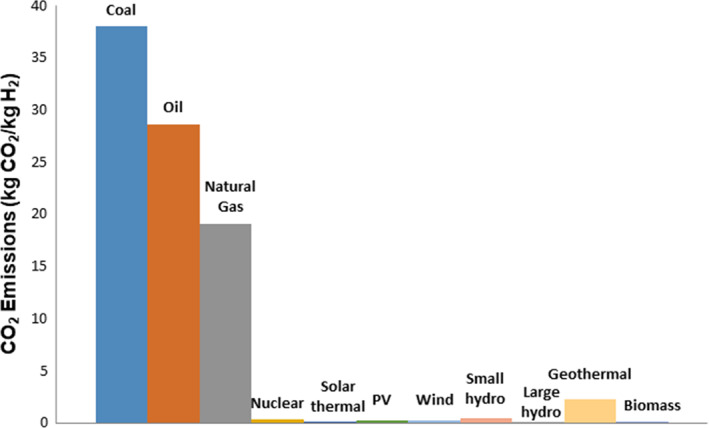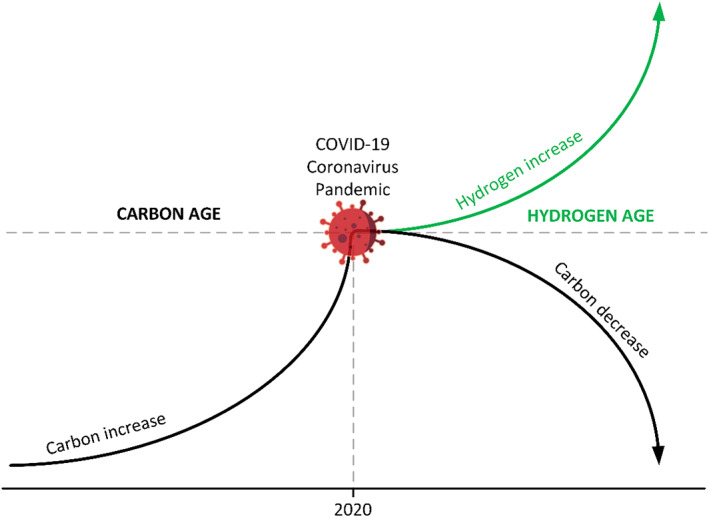1. INTRODUCTION
Humankind started with wood as their energy source for many of their daily things and continued their energy source finding journey over the centuries through various periods, such as coal era (particularly with industrial revolution), oil era (primarily after the first world war), and natural gas era (increasingly after 1980s). There is an ultimate destination in this energy journey toward hydrogen as carbon‐free fuel and energy carrier. This is clearly illustrated in Figure 1 which indicates that Carbon/Hydrogen (C/H) ratio has been decreasing over the centuries and is expected to be zero with hydrogen. This is an indication of a clear move toward carbon‐free economy or carbon‐free society. There have been some researchers and scientists who have argued about the carbon content of wood being more than the carbon content of coal. There are, however, sources suggesting that C/H ratio of wood is about 10 (a ratio of 1 Hydrogen to 10 Carbons) due to the fact that wood is made of cellulose and lignin and that its composition may change among the types of woods but in bounds. However, one should note that most wood is considered cellulose (for details, see: https://phe.rockefeller.edu/docs/WoodsHtoCratio.pdf). Furthermore, one may argue on point about hydrogen that at present it is mostly produced out of fossil fuels (about 50% from natural gas, 30% from oil, and about 15% from coal) worldwide which may not be seen fully clean. This is true! That's why I provide Figure 2 to illustrate the life cycle emissions in terms CO2 equivalent per kilogram of hydrogen produced which clearly shows that clean hydrogen is needed and has to be produced by using renewable energy sources and nuclear to disassociate water into hydrogen and oxygen in a more environmentally benign manner.
Figure 1.

Carbon and hydrogen ratio (C/H ratio) of fuels over the centuries [Color figure can be viewed at wileyonlinelibrary.com]
Figure 2.

The life cycle CO2 emissions during the production of hydrogen from fossil fuels directly and through water disassociation by using nuclear and renewable energy sources (from Dr Dincer's group) [Color figure can be viewed at wileyonlinelibrary.com]
Figure 2 clearly indicates that we cannot follow the path of fossil fuels for hydrogen production and rather need to deploy nuclear and renewable energy options for hydrogen production through electrolysis, thermochemical processes, photonic processes, etc.
We are now in global coronavirus pandemic which has been literally affecting everyone, every community, every city, every country, every region, every sector, every economy, etc. Of course, everyone has been impacted by the virus, one way or another by either directly or indirectly. All dimensions of societal needs, such as health, economy and finance, labor, education, environment, energy, defense, food and agriculture, technology, sustainability, and many more are affected. We have been witnessing that many developing and/or developed countries have been establishing task forces, expert groups, advisory committees, science boards, etc., to identify measures, guide governments, and take actions on health‐related matters and issues only. It is my observation that such health‐related efforts look sufficient while many harshly criticize the organizations and governments. Since politics is not my goal here, I strongly recommend all these countries to immediately start launching task forces, in addition to heath related committees, including but not limited to:
economy and finance,
employee, labor relations, and public works,
business management,
commerce and trade,
marketing,
social media and public relations,
family matters, and social policies and practices,
interior affairs,
foreign affairs,
communications,
justice,
culture,
education,
environment,
energy,
defense,
industry,
transportation,
food and agriculture,
science and technology,
tourism,
sports,
sustainability.
In this perspective article, my aim is to discuss the energy related matters and provide a unique viewpoint related to how the Covid‐19 coronavirus has changed the energy situation and what opportunities it has brought in.
2. COVID‐19 CORONAVIRUS AND HYDROGEN
It is well established that human beings need four basic things for living:
water (consisting of hydrogen and oxygen),
air (consisting of mainly oxygen and nitrogen),
food (consisting of primarily carbon, hydrogen, and oxygen), and
energy.
For a better life, we also need:
clean water,
clean air,
clean food, and
clean energy.
It is important to make a crucial point here that water, air, and food are greatly affected by the way we generate, convert, transport, store, and utilize energy as well as the type of sources. We essentially need clean energy solutions. It is also a known fact that due to increased use of fossil fuels (coal, oil, and natural gas) the world has ended up with many problems related to air, water, and food which have then caused numerous health‐related problems, such as respiratory illnesses, cardiovascular illnesses, chronic lung diseases, gastroenteritis, nausea, muscle and brain damages, nerve disorders, kidney and liver damages, skin irritation, headache and fatigue, high cancer risks, and many more. It is therefore greatly affecting the human body immune system as well.
Air pollution is a major environmental risk to health. By reducing air pollution levels, countries can reduce the burden of disease from stroke, heart disease, lung cancer, and both chronic and acute respiratory diseases, including asthma (https://www.who.int/en/news‐room/fact‐sheets/detail/ambient‐(outdoor)‐air‐quality‐and‐health).
Recently, we have found ourselves in the Covid‐19 coronavirus pandemic that has impacted every human being directly or indirectly. Of course, it has most harshly affected the elderly and people with weak immune system and those inflicted with various respiratory and cardiovascular illnesses. This is clearly a turning point that we can no longer continue fossil fuel era and leave ourselves more fragile to such coronaviruses. It is therefore a defining moment of opening a new age with hydrogen and closing the carbon age as illustrated in Figure 3. Covid‐19 coronavirus has made it an absolute necessity that people need cleaner air, cleaner water, cleaner food, and cleaner energy more than ever. As illustrated in Figure 3, we have been in a carbon age with hydrocarbon fuels up until the coronavirus outbreak juncture in 2020 and will now have to continue change the driver to hydrogen which is the beginning of hydrogen age where the use of hydrocarbon fuels (fossil fuels) will decrease exponentially and the use of hydrogen energy will increase accordingly. In this hydrogen age, it is expected to achieve the following benefits:
better environment,
better ecosystem,
better efficiency,
better energy solutions,
better resources use,
better sectoral development,
better economy and economic development,
better synchronization with renewable energy options,
better health and healthier societies,
better sustainable development.
Figure 3.

Covid‐19 coronavirus pandemic making a historical turning point for the hydrogen age [Color figure can be viewed at wileyonlinelibrary.com]
The founding father of hydrogen movement is Dr T. Nejat Veziroglu who started his activities in 1974 with a conference, an organization (ie, International Association for Hydrogen Energy), a journal (ie, International Journal of Hydrogen Energy) and many more events and activities. Dr Veziroglu has tried to reach and help out every one in the world. He even called this movement for hydrogen civilization and developed the concepts over the year to help people and societies for a sustainable future. Due to all what he has done, I call him the mastermind of hydrogen society.
During the past few years there have been increasing efforts exerted by various organizations, such as World Energy Council, International Energy Agency, International Renewable Energy Agency, and National Hydrogen Associations in many countries (including Turkey). There have been major initiatives worldwide by various people and organizations as well as governments, such as Hydrogen Council launched in January 2017 in Davos, Switzerland, initially by 13 global industry leaders join together in promoting hydrogen to help meet climate goals (for details, see: https://hydrogencouncil.com/en/), and later Hydrogen Energy Ministerial Meeting with the responsible ministers and officials from 21 countries held in Tokyo, Japan in October 2018 to help achieve the realization of hydrogen‐powered society as its main subject (followed by another meeting in September 2019 with some major targets by Japan as 10 000 hydrogen filling stations and 10 million hydrogen‐powered systems and vehicles in 10 years) (for details, see: https://h2em2019.go.jp/en/).
Numerous government initiatives have been launched in many countries, such as hydrogen‐powered train in Germany, hydrogen‐powered cruise ship in Norway, hydrogen fueled aircraft in United Kingdom, and many more around the globe. One recent project has been in Australia where the small coastal town of Denham, in Western Australia's Shark Bay world heritage area, has been identified as a zero‐emission community. The town prepares for the demonstration of a hydrogen plant powered by solar energy (for details see: https://www.abc.net.au/news/2020‐01‐15/denham‐near‐shark‐bay‐first‐wa‐town‐to‐be‐powered‐by‐hydrogen/11870472). By the way, there are many more villages and towns identified around the world to be emissions‐free communities.
Furthermore, the Covid‐19 coronavirus outbreak, despite creating many problems and issues during these uncertain and unprecedented times, has been a break for the world to help reduce air pollution, in particular greenhouse gases (ranging from NO2 to CO2). Here, there are two examples, one from Italy and one from China. Figure 4 shows a huge decrease in air pollution above Italy during the coronavirus quarantine as reported by the European Space Agency (ESA) and a few independent researchers report. Obviously, nitrogen dioxide (NO2) emissions over Italy have decreased significantly since the country went on lockdown. The decrease in NO2 levels was even captured by the Copernicus Sentinel‐5P satellite and is especially visible in Northern Italy (for details, see: https://www.demilked.com/italy‐coronavirus‐pollution‐decrease/).
Figure 4.

Illustration of the dramatic decrease in NO2 pollution from the month of January (left) to the month of March (right) above Italy during the coronavirus quarantine (https://www.demilked.com/italy-coronavirus-pollution-decrease/) [Color figure can be viewed at wileyonlinelibrary.com]
Coronavirus shutdowns have resulted in unintended climate benefits such as cleaner air and clearer water, a large‐scale shift to hydrogen energy may make these unintended benefits permanent achievements (https://www.nbcnews.com/science/environment/coronavirus‐shutdowns‐have‐unintended‐climate‐benefits‐n1161921).
A recent study confirmed that finding: Coronavirus temporarily reduced China's CO2 emissions by a quarter (https://www.carbonbrief.org/analysis‐coronavirus‐has‐temporarily‐reduced‐chinas‐co2‐emissions‐by‐a‐quarter) where China's overall carbon emissions fell by around 25% over a 4‐week period, equivalent to around 200 million tonnes of CO2 (MtCO2).
A large‐scale shift to hydrogen energy will eliminate the entrained particles coming with the flue gases of the power plants and industrial plants and exhaust gases of the vehicles, and will bring out substantial health benefits (https://www.environmental‐protection.org.uk/policy‐areas/air‐quality/about‐air‐pollution/particles/).
3. CLOSING REMARKS
In this perspective article, one may extract the following statements:
Increased use of fossil fuels has caused many human health issues, ranging from chronic lung diseases to weak immune system, which have resulted vulnerability for people to be impacted by the virus.
Hydrogen appears to be a unique option for better human health and welfare due to the following benefits: better environment, better efficiency, better economy, and better sustainability.
Hydrogen energy options will help achieve healthier people and societies, and better climate, ecology, and environment.
Covid‐19 coronavirus pandemic appears to be a turning point for hydrogen age and the closure for carbon age.
Dincer I. Covid‐19 coronavirus: Closing carbon age, but opening hydrogen age. Int J Energy Res. 2020;44:6093–6097. 10.1002/er.5569


